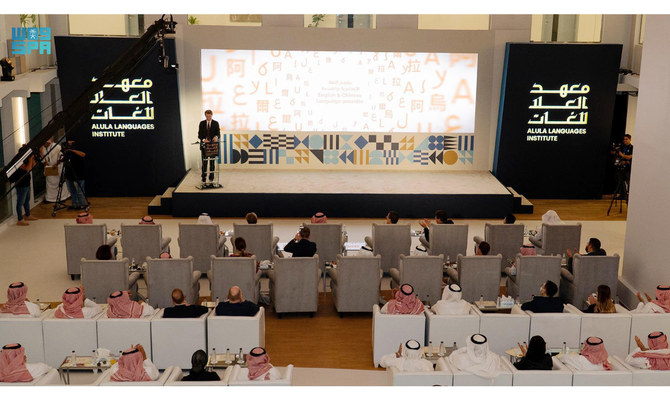JEDDAH: Residents of AlUla will welcome tourists from all over the world in Arabic and Chinese, English, French, and Nabatean, the language of the people who lived in the city thousands of years ago.
The Royal Commission for AlUla inaugurated the AlUla Languages Institute on Tuesday, and aims to develop the communication skills of the city’s young people. The institute is part of other programs that the RCU offers to AlUla citizens and is also part of the historical city’s sustainable development strategy.
The institute, a center for learning and cultural exchange, will offer courses in Arabic, English, French, Mandarin Chinese, and Nabatean, which was spoken in the first centuries of settlement in the northwest of the Arabian Peninsula, an area rich with historical references and Nabatean inscriptions.
HIGHLIGHTS
• The institute will provide opportunities for its members to effectively communicate with visitors and share AlUla’s legacy.
• It will offer Arabic language courses to visitors and residents to discover more about Saudi culture and the ancient civilizations.
• Students can choose between a general course program, ten hours per week for $58.4, or an intensive course of 32 hours a week priced at SR450.
• In line with the Saudi plan to further the teaching of the Chinese language, the institute launched a unique language program to teach Chinese to all residents of AlUla.
The 19-classroom institute seeks to enhance the linguistic ability of the citizens of AlUla.
The institute will provide opportunities for its members to effectively communicate with visitors and share AlUla’s legacy.
It will offer Arabic language courses to visitors and residents to discover more about Saudi culture and the ancient civilizations. Students can choose between a general course program, ten hours per week for SR219 ($58.4), or an intensive course of 32 hours a week priced at SR450.
In line with the Saudi plan to further the teaching of the Chinese language, the institute launched a unique language program to teach Chinese to all residents of AlUla.
A 10-hour Chinese course can cost up to SR219 per week, while an applicant can register for Nabatean courses that run between two or six hours a week for SR50 or SR150.
The diversity of languages offered at the institute reflects the RCU’s plan to welcome tourists from all corners of the globe and enable students to master the language skills necessary for communication, contributing effectively to developing AlUla and enhancing global cultural communication.
RCU Gov. Prince Badr bin Abdullah bin Farhan said that language is the main bridge for communication and knowledge. “The languages that the institute will provide will be essential to tell the story of AlUla in the most important international languages.”
He added: “Children of the homeland in AlUla are main partners in realizing its vision, and AlUla Languages Institute will provide them with an important opportunity to develop their skills to speak and interact with visitors and tourists, so as to be able to narrate the historical story of AlUla through a new chapter for the biggest living museum in the world.”
On Twitter, Prince Badr said that the new institute would begin teaching “Arabic, Nabatean, English, French, and Chinese” to reinforce AlUla’s historic role as a meeting point for civilizations and as one of the most important cultural destinations in the world.
Speaking at the inauguration ceremony, General Director of Alliance Française d’Arabie Saoudite Marguerite Bickel expressed her joy at announcing the official opening of the fifth branch of AFAS within the AlUla Languages Institute.
The British Ambassador to Saudi Arabia Neil Crompton said that he was delighted to attend the institute’s opening in AlUla. In a tweet, he added: “Teaching English, French, Mandarin, Arabic and Nabatean, the institute will help create local jobs and improve the experience for tourists coming to see the beautiful sites in AlUla.”
The institute will support the RCU’s AlUla Scholarship Program, preparing candidates to join the world’s most prestigious universities and educational institutes.
Commenting on the institute’s inauguration, the commission’s CEO Amr bin Saleh Al-Madani said that language is the basis for opportunities and effective interaction with visitors, which is an essential journey for the development of the place that suits AlUla’s history in welcoming the world to the cradle of civilizations.
A Jeddah-based English language instructor, Saleh Al-Ghamdi, told Arab News that he expects AlUla to attract millions of tourists annually.
“With the institute offering Arabic classes, non-Arabic-speaking tourists will find a chance to learn more about the Arabic culture through the language. Tourists are not only interested in exploring new places, but also new languages and cultures,” he said.




























